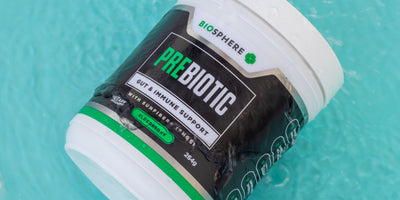
Fortify Your Defence with Prebiotic Elegance
Introduction to Prebiotics
The term "prebiotics" may conjure images of a futuristic healthcare regimen, but the concept is rooted in well-established science. Prebiotics are a form of non-digestible fibres that promote the growth and activity of beneficial bacteria in the gut. They are to probiotics what fertiliser is to a garden: nourishment for the good stuff.
But why should you care? As research unfolds, it's becoming increasingly clear that prebiotics have wide-ranging effects on overall health, from boosting the immune system to enhancing mental wellness. In this article, we will delve into the science of prebiotics, explore the elegance of their mechanisms, and discuss how they can fortify your defence against various health issues.
Before we move ahead, it's essential to clarify that prebiotics are different from probiotics. While probiotics are live microorganisms that can provide health benefits when consumed in adequate amounts, prebiotics are compounds that help these microorganisms flourish.
We'll also address the critical question of balance—too much of a good thing can sometimes have downsides. Opting for a diet rich in prebiotics without understanding the nuances can lead to digestive discomfort and other issues.
Finally, let's look at the broader impact of prebiotics on our well-being. With an emphasis on accessibility, this article aims to offer a comprehensive and objective analysis of the key factors that impact the integration of prebiotics into your health regimen.
Gut Microbiome Essentials
The gut microbiome refers to the community of trillions of bacteria living in our digestive system. Think of it as a bustling city inside you, with good and bad bacteria constantly in flux. A healthy gut microbiome is predominantly populated by beneficial bacteria that help with nutrient absorption, produce certain vitamins, and keep harmful pathogens at bay.
However, factors like stress, poor diet, and antibiotic usage can disrupt this microbial equilibrium. When harmful bacteria outweigh the beneficial ones, it can lead to a variety of health problems ranging from digestive issues to impaired immune function.
Enter prebiotics. These compounds feed the good bacteria, giving them the fuel they need to multiply and edge out the harmful bacteria. By promoting a more balanced gut microbiome, prebiotics lay the foundation for broader health benefits.
But it's not that simple. The gut microbiome is a complex ecosystem, and introducing prebiotics can sometimes cause a temporary imbalance before the good bacteria take over. Moreover, the ideal prebiotic "dosage" can vary from person to person, depending on factors like age, existing health conditions, and lifestyle.
And then there's the issue of specificity—different types of prebiotics promote the growth of different kinds of beneficial bacteria. Not all prebiotics are created equal, and choosing the right one for your needs is essential for maximising health benefits.
The Prebiotic Elegance
What makes prebiotics elegant is their targeted action. Unlike antibiotics, which carpet-bomb both good and bad bacteria, prebiotics selectively nourish beneficial bacteria, like bifidobacteria and lactobacilli, allowing them to flourish and maintain gut balance.
Additionally, prebiotics naturally occur in a variety of foods—fruits, vegetables, and grains—making them accessible for most people. This "elegance" also extends to how prebiotics function in concert with probiotics, creating a symbiotic relationship that amplifies health benefits.
However, the elegance of prebiotics can be a double-edged sword. They are very effective but need to be consumed in the right amounts and from the right sources to optimise benefits. Overconsumption can lead to digestive issues like bloating and gas, and a lack of variety in prebiotic sources can result in a less diverse gut microbiome.
It's also worth noting that prebiotics are not a one-size-fits-all solution. The types of beneficial bacteria that flourish in one person's gut might differ from those in another's, requiring individualised approaches to prebiotic consumption.
Bifidobacteria Brilliance
One of the most well-researched beneficiaries of prebiotics is the Bifidobacteria species. These bacteria are essential for a healthy gut, contributing to everything from enhanced nutrient absorption to immune system support. The brilliance of Bifidobacteria lies in their versatility; they adapt well to different types of prebiotics, ranging from inulin to fructooligosaccharides (FOS).
Research has shown that Bifidobacteria can lower the pH of the gut, making it less hospitable for harmful bacteria. They are also implicated in the production of essential vitamins like B12, folic acid, and thiamine.
That said, a focus solely on Bifidobacteria can overlook the need for a diverse gut microbiome. While they are undoubtedly beneficial, they are not the only good bacteria that contribute to a healthy gut. Balancing Bifidobacteria with other beneficial microorganisms is crucial for holistic gut health.
Moreover, Bifidobacteria concentrations naturally decline with age. So, while younger people might easily maintain a healthy level of these bacteria, older individuals may need more targeted interventions.
Immune System Reinforcement
One of the most remarkable attributes of prebiotics is their ability to bolster the immune system. By promoting a balanced gut microbiome, prebiotics indirectly strengthen the gut's barrier function, making it harder for pathogens to enter the bloodstream.
A strong immune system is crucial for fending off illnesses and infections, but it's a delicate balancing act. Overstimulating the immune system can lead to chronic inflammation and autoimmunity. Prebiotics offer a more nuanced approach, creating an environment where beneficial bacteria can produce anti-inflammatory compounds and regulate immune responses.
However, this immune modulation is still not entirely understood. While there is strong evidence supporting the role of prebiotics in immune function, individual responses can vary significantly. Certain populations, such as those with existing autoimmune conditions, should consult healthcare professionals before making drastic changes to their prebiotic intake.
Gut-Brain Axis: Mental Wellness
The gut-brain axis refers to the two-way communication between the digestive system and the central nervous system. There is growing evidence that a balanced gut microbiome can positively influence mental wellness by regulating neurotransmitters like serotonin, often referred to as the "happiness hormone."
However, research in this area is still nascent, and the exact mechanisms remain unclear. While the promise of prebiotics improving mental wellness is exciting, overreliance on them without considering other treatment modalities, like medications and psychotherapy, can be misguided.
Moreover, mental wellness is a complex interplay of various factors—genetics, lifestyle, environment—and focusing solely on prebiotics may not yield the desired results.
Prebiotic-Rich Foods

However, people with digestive issues like irritable bowel syndrome (IBS) may find some prebiotic-rich foods exacerbate their symptoms. In such cases, a more tailored approach to prebiotic consumption, possibly through supplements, might be advisable.
Prebiotics as a Complement
Prebiotics are a valuable addition to a comprehensive healthcare strategy. They work well with other components of a balanced diet, medications, and lifestyle modifications. For example, pairing prebiotics with probiotic supplements can create a synergistic effect, amplifying the benefits of each.
However, it's essential to view prebiotics as a complement rather than a substitute for medical treatments, especially for conditions requiring medical intervention like infections or chronic illnesses. While prebiotics can support gut health, they are not a cure-all.
It's also important to consider potential interactions between prebiotics and medications. Some drugs, like certain antibiotics, can disrupt the gut microbiome, and the simultaneous use of prebiotics may either be less effective or, in some cases, exacerbate imbalances.
Therefore, consult your healthcare provider before making substantial changes to your prebiotic intake, particularly if you're on medication or have pre-existing health conditions.
Digestive Comfort
Prebiotics offer a range of benefits for digestive comfort, including regular bowel movements and reduced bloating. They can help manage conditions like constipation by creating a favourable environment for beneficial bacteria that assist in digestion.
That said, the journey to digestive comfort isn't always smooth. Initially, a sudden increase in prebiotic intake can lead to digestive discomfort, including gas, bloating, and even diarrhea. This discomfort usually subsides as the gut microbiome adjusts, but it can be a deterrent for many.
If you're new to prebiotics, it's advisable to introduce them gradually into your diet to allow your gut time to adjust. Also, because different types of prebiotics feed different beneficial bacteria, a varied prebiotic intake can help maintain a balanced gut microbiome and contribute to long-term digestive comfort
Fortify Your Defence
In the end, prebiotics offer an elegant and increasingly well-understood avenue for fortifying your body's defences. They provide a natural, targeted way to enhance your health, ranging from bolstering your immune system to potentially improving your mental wellness.
Yet, it's crucial to remember the trade-offs and challenges involved. The gut microbiome is a complex and delicately balanced ecosystem. Throwing it off-balance, even with good intentions, can sometimes lead to discomfort and require time for readjustment.
Moreover, while the benefits of prebiotics are broad-ranging, they are not a standalone solution for health. They function best as part of a balanced diet and a holistic approach to wellness that may include medication, exercise, and other lifestyle changes.
By understanding the subtleties involved in prebiotic use, you can make informed decisions that bring you closer to a healthier, more resilient self. As research continues to unfold, the elegance of prebiotics as a means to fortify your defence against a myriad of health challenges becomes increasingly apparent.
In a world where healthcare is becoming more personalised, the nuanced role of prebiotics offers promising avenues for individualised wellness strategies. However, like all good things in life, the key lies in balance, careful selection, and an integrated approach to health and well-being.
And so, the next time you find yourself pondering how to fortify your defences in the complex realm of health, consider the nuanced elegance of prebiotics as a compelling part of the answer.
Summary
Introduction to Prebiotics- Prebiotics, non-digestible fibres, nourish beneficial gut bacteria.
- They impact health, enhancing immunity and mental wellness.
- Unlike probiotics, prebiotics aren’t live organisms but help them thrive.
- Proper balance is vital to avoid digestive issues.
- The gut microbiome, hosting trillions of bacteria, aids nutrient absorption and pathogen defence.
- Stress and poor diet can disrupt this bacterial balance, causing health issues.
- Prebiotics feed beneficial bacteria, supporting a balanced gut.
- Ideal prebiotic intake varies individually and affects different beneficial bacteria.
- Prebiotics selectively nourish beneficial bacteria without harming them.
- They are found in various foods, including fruits and grains.
- Appropriate amounts and varieties are crucial to optimise benefits and avoid digestive issues.
- Bifidobacteria, vital for gut health, adapt to different prebiotics.
- They can inhibit harmful bacteria and produce essential vitamins.
- Focusing only on them can neglect microbiome diversity.
- Prebiotics strengthen the gut barrier and may modulate immune responses.
- Their exact mechanisms and individual responses can vary.
- A balanced gut may influence mental wellness by regulating neurotransmitters.
- Research is ongoing, and focusing solely on prebiotics for mental wellness may be insufficient.
- Bananas, asparagus, onions, and garlic are rich in prebiotics.
- Some prebiotic-rich foods might exacerbate IBS symptoms, requiring tailored approaches.
- Prebiotics, valuable in healthcare, work well with probiotics but aren’t a substitute for medical treatments.
- Potential interactions with medications need consideration.
- Prebiotics assist in managing conditions like constipation and reducing bloating.
- Gradual incorporation into the diet is advisable to minimise initial digestive discomfort.
- Prebiotics enhance health, from immunity to mental wellness, but involve trade-offs and challenges.
- They function best as part of a balanced diet and holistic wellness approach.
- Ongoing research reveals prebiotics' potential in personalised healthcare strategies.
- Balance, careful selection, and an integrated approach are key to leveraging their benefits.
Prebiotic Information
For everything you need to know about prebiotics and prebiotic supplements, check out our comprehensive information page here.
Prebiotic
Biosphere Nutrition’s Prebiotic Powder is a unique blend of Sunfiber® and Black Elderberry Extract, designed to nurture gut health and support the immune system. This easy-to-mix, great-tasting formula ensures optimal absorption and digestive comfort. To learn more about our Prebiotic, check out the product page here.









